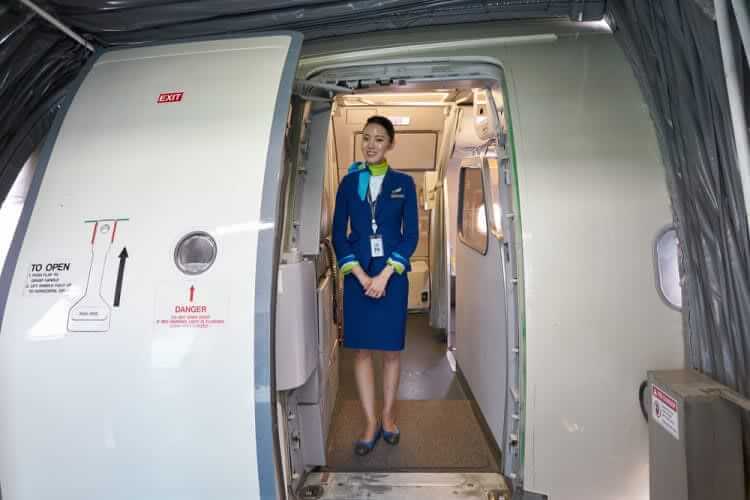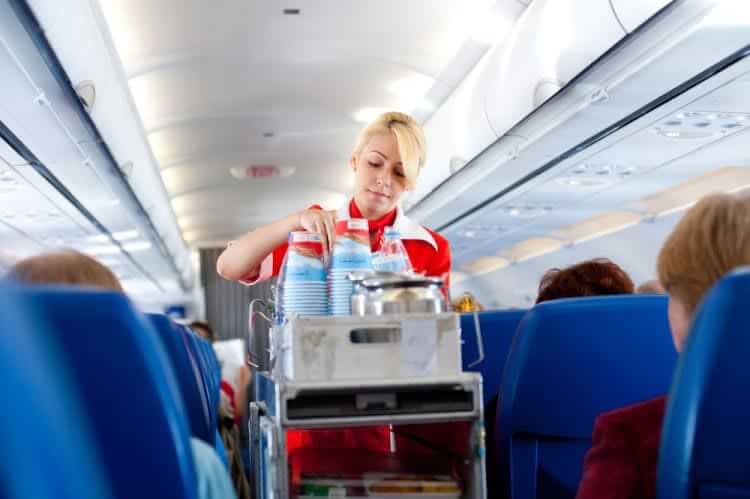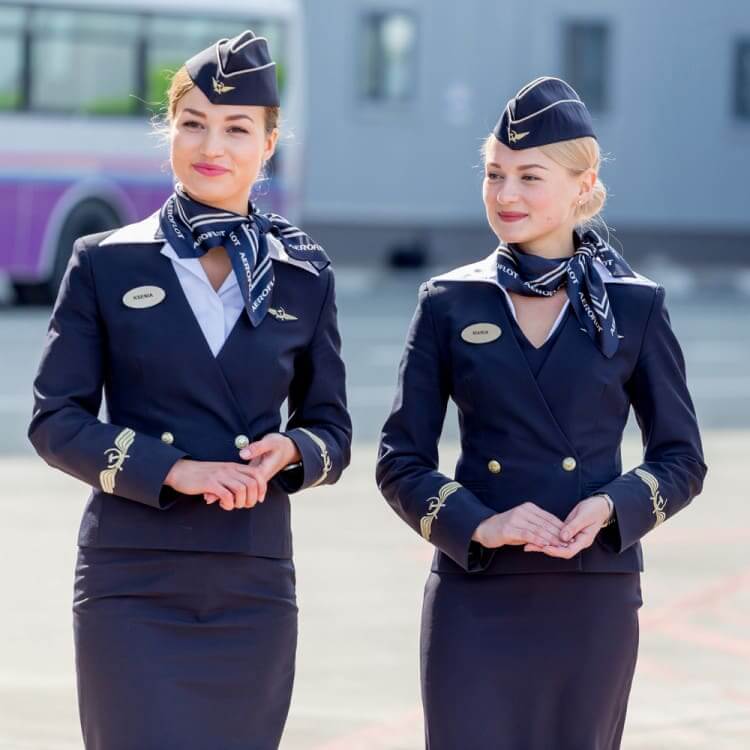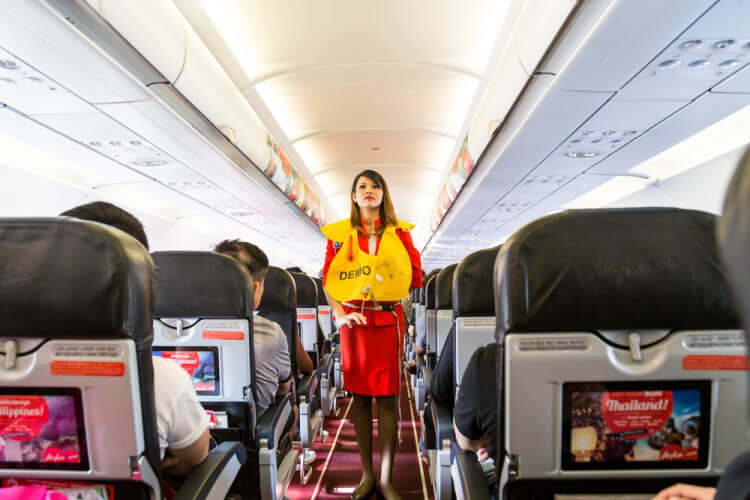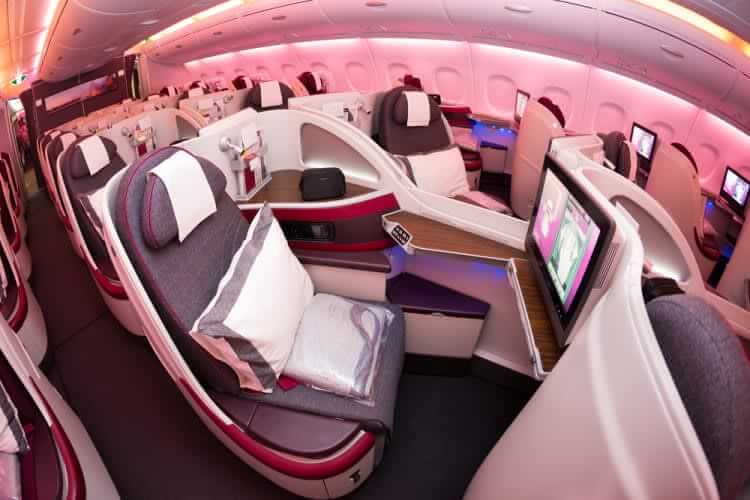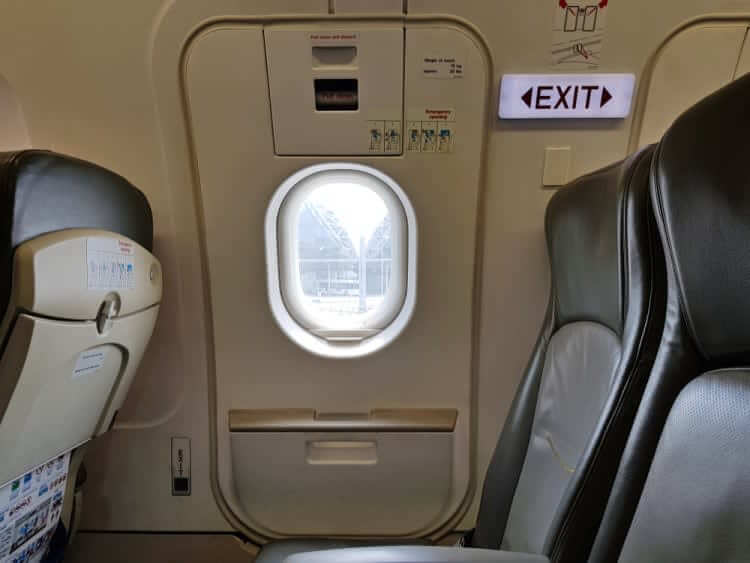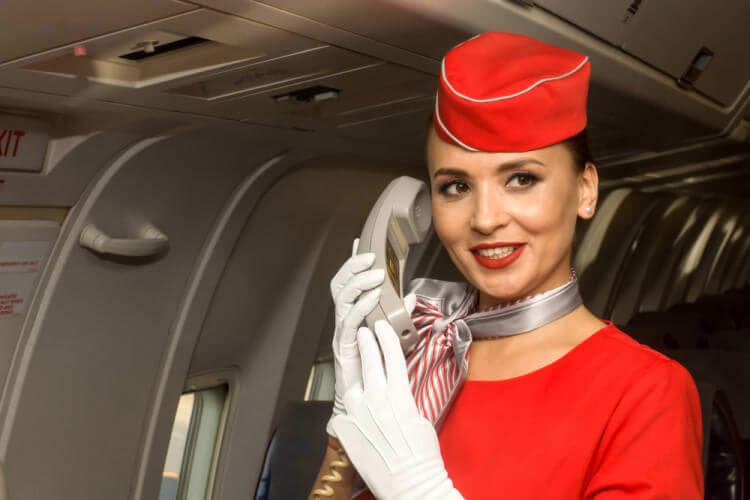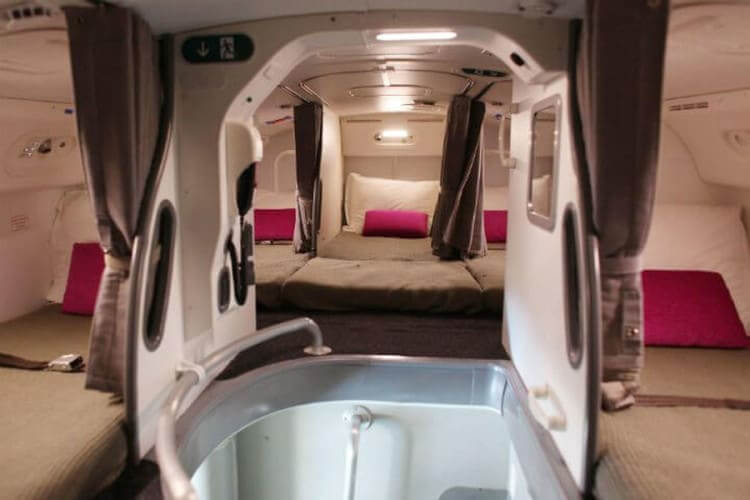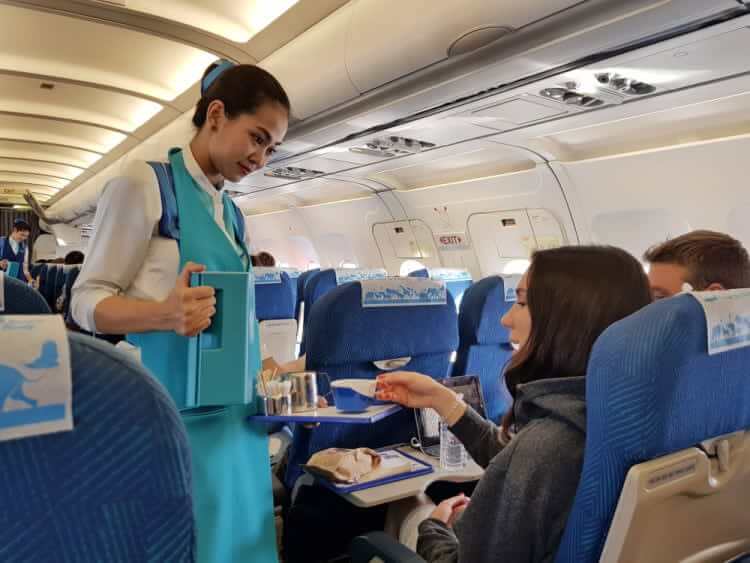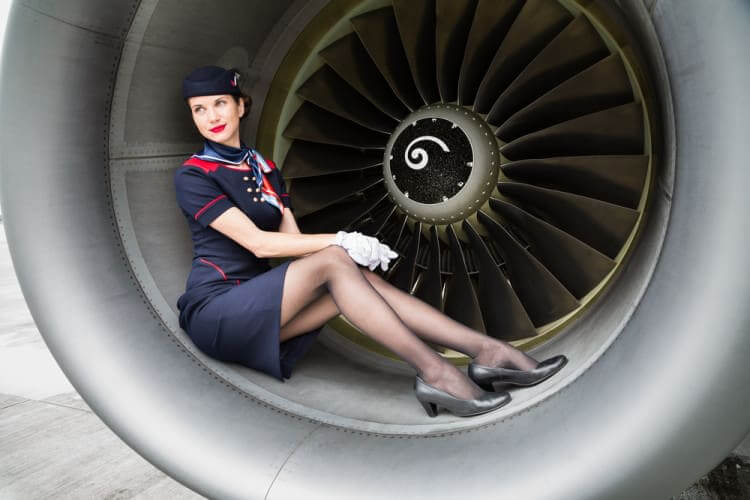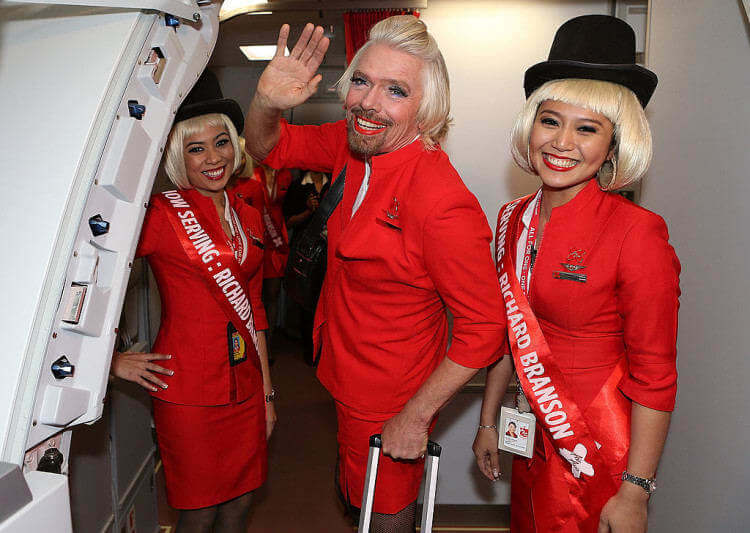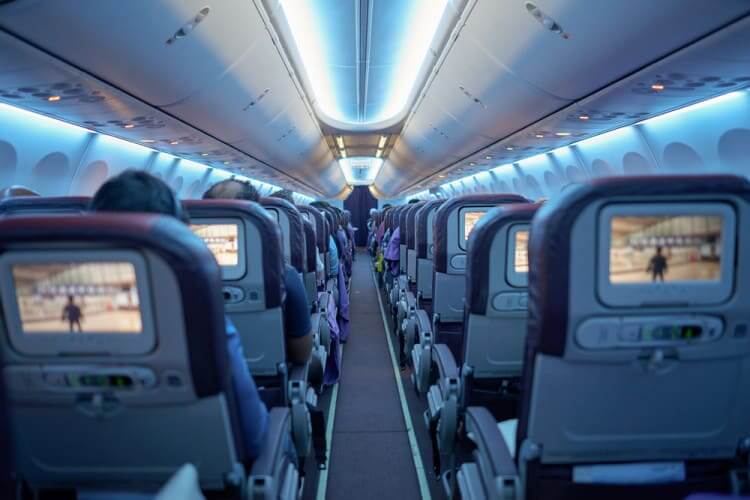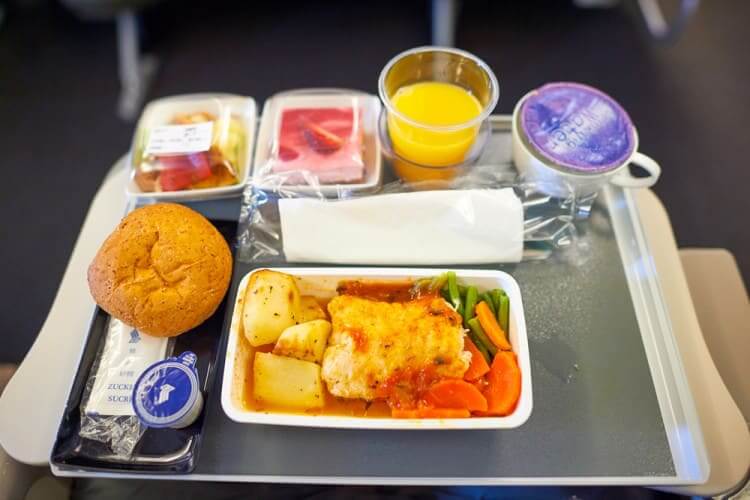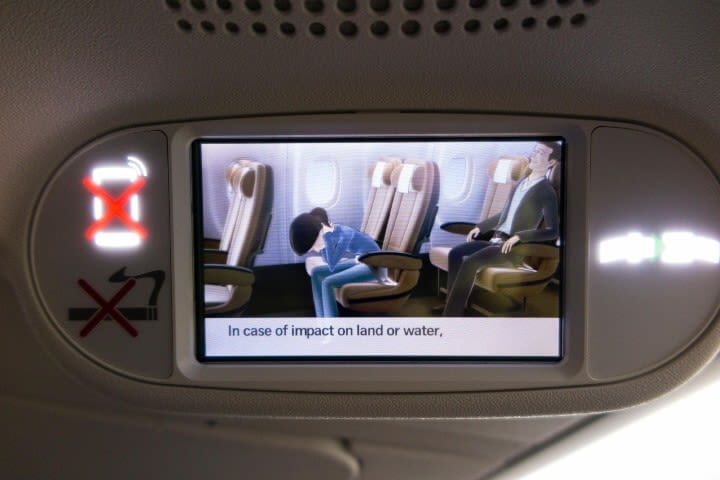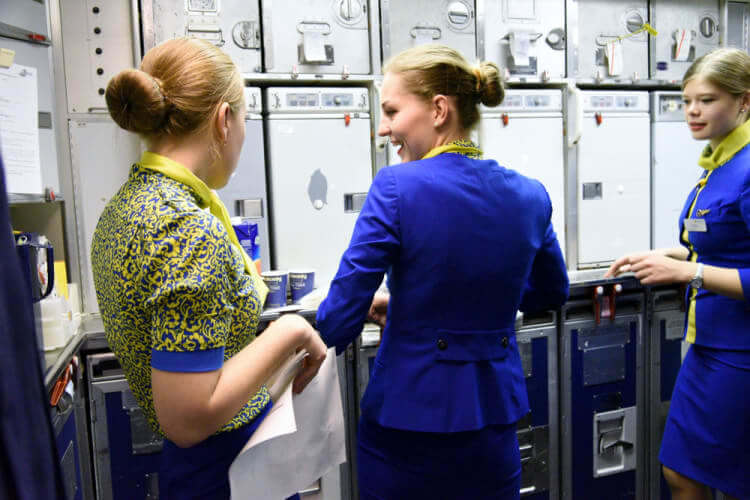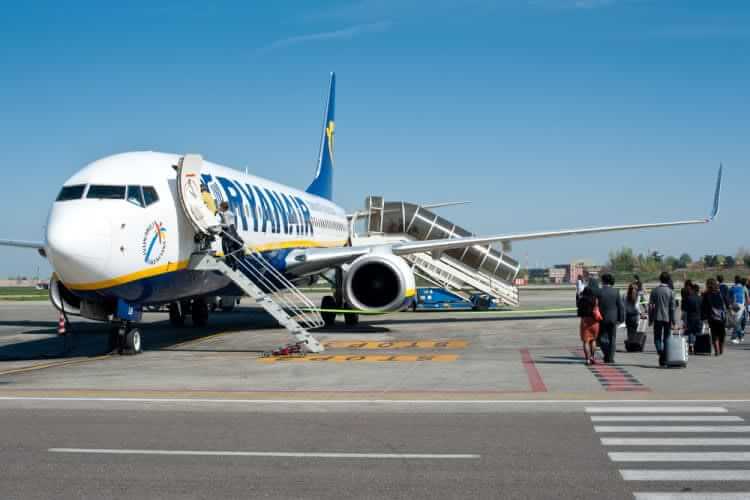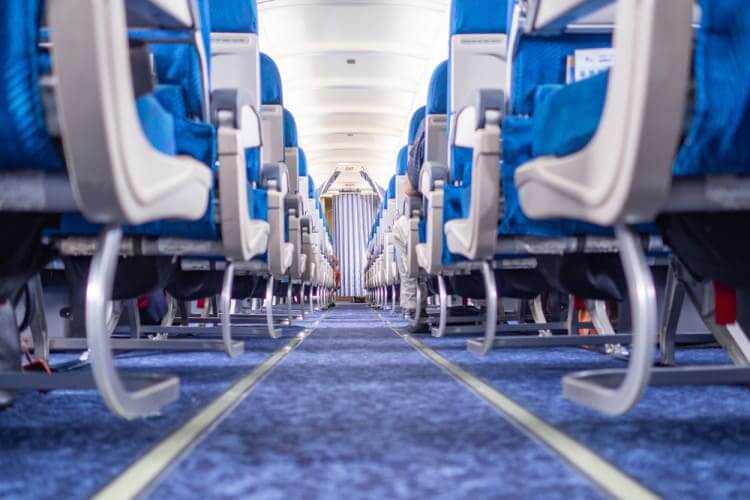1. Greeting or More of An Assessment
When the flight crew greets you upon entering the aircraft, do you think it is just a polite formality? Well, most people think this practice is intended to make passengers feel comfortable. It is true to some extent, but crew members also use it to assess the passengers.
They use the greeting to get a better idea of passengers who could be problematic. They also look for people who are physically fit or disabled, intoxicated, traveling in a group or alone.
2. Think Twice Before Asking For Diet Coke
Out of all the other things, one thing that flight attendants really hate is when passengers order Diet Coke. When one passenger orders it, the beverage cart goes around for others as well. It is because the carbonated fizz in Diet Coke takes a lot of time to settle at an altitude of 35,000 feet and it takes the most time to pour Diet Coke as compared to other beverages.
Flight attendants also hate to pour this fizzy drink because they have to pay close attention to not overflow a cup and that's why it takes three times as long to pour this drink as compared to other drinks. Nevertheless, they will still serve it you even if they despise it.
3. The Job Doesn’t Pay Very High
There is a common opinion that flight attendants live a glamorous lifestyle as they are able to travel the world as a part of their job and visit different places. However, the truth is that they are almost always busy and have a hectic schedule which prevents them from exploring other places.
In fact, they are only paid once the main cabin doors are shut. It means that delays and cancellations affect and annoy them as much as the passengers. It kind of affects them more because they don't get paid unless the plain boards. Although some airlines have relaxing policies regarding it, we have to respect their patience.
4. How Safe Are Airplanes?
Have you ever wondered if the airplane is thoroughly checked before taking off every time? Although there is a big list of constraints that are checked every time before a flight takes off, there are still some minor failures that are left unattended to ensure that flights are on time and there's no delay. But don't worry because these minor failures aren't supposed to affect safety provisions.
When it comes to in-flight safety, planes are sturdy enough to withstand getting struck by lightning or thunderstorms. It is important to buckle up during flight because most turbulence-related injuries happen when some passengers forget or ignore to fasten their seat belts.
5. Anyone Wants An Upgrade?
An upgrade is like winning a lottery in the air travel world. No one can tell for sure the proven-way to get an upgrade every time. However, it certainly helps your case if you are not a rude person. Things that can strengthen your chances of getting an upgrade are; you are extremely tall, attractive, well-dressed, pregnant, or a friend of the flight crew. And hey, always try to be nice to the flight crew.
According to one anonymous flight attendant, getting an upgrade to first or business class is still possible even after the cabin doors close. However, it doesn't often happen a lot. Still, who knows you might hit the jackpot someday.
6. Handling Emergency On A Plane
Have you ever wondered what happens in case there's a medical emergency on a plane? Well, the flight attendants are given enough training to act as first responders if there's a medical emergency and they can perform the Heimlich maneuver or administer CPR. There are also first aid kits and planes that carry over 30 passengers have defibrillators as well.
Also, the cabin crew asks if there's a doctor on board whenever there's an emergency. In case of a grave situation, a pilot can either land a plane or divert it, which usually takes around 15 minutes. However, it becomes more difficult if it is an overseas flight.
7. Using Secret Communication Code
The flight crew does use a secret communication code because there are certain things that they don't want the passengers to know. It is completely understandable because they don't want to cause any panic among the passengers. So, they use certain codes to indicate what's going on.
You may hear certain beeping sounds during flight and they are not just some call buttons. According to insiders, the "dings" are used during the takeoff and landing to signal the crew that everything is okay as most dangerous stages are over. There are other bells for severe turbulence, emergency, and also if someone tries to enter the cockpit.
8. Flight Crew Need to Sleep As Well
Although the hectic schedule prevents the flight crew from taking a nap to re-energize their body, they still have to rest like the rest of us. On domestic flights, they mostly don't have the luxury of sleeping, but they have special sleeping cabins on long-haul flights. For instance, Boeing 777 and 787 jets have sleeping quarters for the flight crew.
Pilots also have assigned rest periods and sleeping berth which is usually located in a separate compartment. When the pilot gets some much-needed sleep, the co-pilot takes control of the plane.
9. Not So Clean Water
It is recommended not to drink water from lavatory tap on airplanes (for good reasons, of course). But what about the potable water which is used in tea and coffee. Many flight attendants do recommend sticking to bottled beverages and not drinking coffee or tea on the plane.
The tanks for the drinks are clean, but still there are doubts over how often they are cleaned. But we cannot ignore that the valve for filling clean water is quite close to the one for cleaning lavatory waste.
10. Certain Standards for How The Flight Attendants Need to Look
Although there are a rigid set of criteria which some airlines follow (e.g. age, weight, personal grooming), there are airlines that don’t make their flight staff follow such strict standards anymore.
However, airlines do emphasize on professional presentation and appearance and some of them even have height parameters to ensure that the flight staff can easily perform their duties.
11. They're Not Stewardesses Anymore
Those days are gone when flight attendants only used to serve food and beverages. Now, they do more than just babysit or wait for passengers. The flight attendants are trained enough to administer CRP, user AEDs, EpiPens, and defibrillators.
They are also trained to handle an unruly passenger, self-defense, and emergency evacuation, as well as attempted hijacking. One of their main responsibilities is to guard the cockpit so that no one enters it during the flight.
12. Why Flight Attendants Turn Off The Cabin Lights During Takeoff and Landing
No, the lights are not dimmed to create a more relaxing ambience for the passengers. There is a more serious reason behind dimming the cabin lights in commercial flights before take-off and landing. Here is a hint for you: It has a lot to do with airplanes being prone to problems and accidents during take-offs and landings.
The main reason behind doing is to allow the eyes to adjust to the lack of light if there is an emergency. In case of an accident or emergency that requires immediate evacuation, the lit signs become more visible.
13. Unhealthy Airplane Food?
Do you believe that ignorance is bliss? Well, you might've wondered if the pre-packaged food provided during flights is healthy or not. After all, it could be processed and lack natural ingredients.
It turns out that mid-flight meals are quite unhealthy for you because they have almost zero nutritional value. They are just loaded with fat, sugar, salt and carbs. We would highly recommend you to eat something before you board, especially if you a frequent flyer or health-conscious.
14. Busting the Brace Position Myth
Okay, let's talk about the brace position myth. As the commercial aviation security procedures recommend passengers to adopt a position to brace themselves for impact on water or land, there are many conspiracies about it that it helps with a quicker death. But experts reject these conspiracies.
According to experts, the purpose of the brace position is to compact the body in a way that your vital organs are protected from injury. This position also helps facilitates the force of a crash to channel into the chair instead of your body. You can also check "MythBusters” to find out more about it.
15. Getting Drunk on a Flight
Most of you get excited seeing the mini bottles on your flight, but you know very well that drinking too much is not the best option. If a flight attendant sees that you're getting a bit too buzzed, she can cut you off. It is because getting intoxicated on a plane is illegal and the same goes for flight attendants as they cannot provide more alcohol to passengers to get drunk.
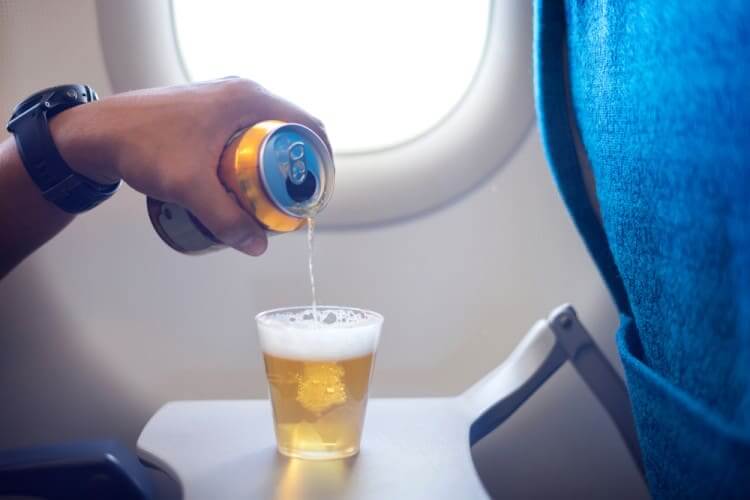
If you get intoxicated on a plane and cause some major disturbance (which you will once you get too much drunk), you can get up to a two-year sentence. We also recommend you to drink in moderation because the changing cabin pressure increases the impact of each glass of alcohol as compared to what it would on land.
16. Important: Be Nice to Flight Attendants
Being polite to everyone in life is the best thing you can do to strangers. If you are polite to your flight attendant, it can certainly go in your favor. Flight attendants work on long shifts and even have to run from flight to flight without taking naps.
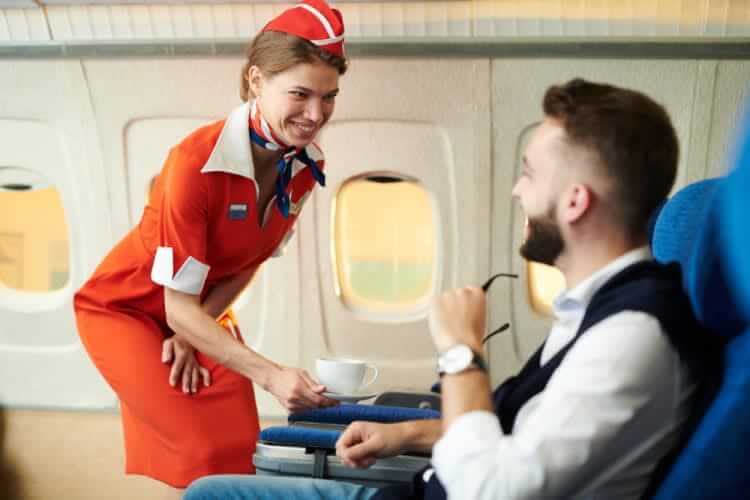
They deserve your respect and polite behavior. By being polite to a flight attendant, you can get better seating. And if you are rude to them, who knows you might get a seat in the middle of children and babies. And trust us, they cry a lot to make your journey “super pleasant.”
17. Ah, The Unused Food Question
If you ever wondered what happens to the unused food after every flight, it is best not to find the answer. Some airlines simply dump unused food. But given that many airlines try to save as much money as they can, it would be no surprise if they serve you some old food.
Despite what some think that airplanes serve old food to their passengers, one travel catering expert claim that airplanes only serve fresh food which is prepared between 12 to 72 hours ahead of time. We'll let you decide on it.
18. About Those Blankets and Pillows…
According to experts, the dirtiest part of the planes is the tray tables. So, you can get some relief knowing that in-flight pillows and blankets are not as bad as the tray tables. But there is no denying that the pillows, blankets, and headphones are not really clean.
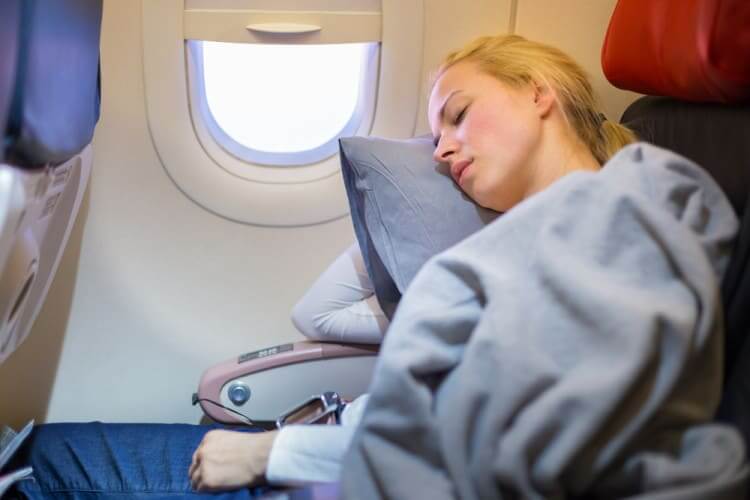
Despite the fact that they are repackaged with plastic wrap, airlines don't spend money on providing new amenities to passengers every time. According to sources, these amenities aren't even washed. On the other hand, you're more likely to get fresh blankets and pillows on the coach class. So, we would recommend you to bring your own blanket and pillow.
19. What About Breathing in Plane Air?
It is best to ignore the possibility of contracting airborne viruses while traveling in a plane. Nevertheless, questions about it do come into our minds. After all, how do we know about the effectiveness of cabin ventilation systems and how they can help if healthy people are traveling in a cramped cabin where someone is coughing and sneezing?
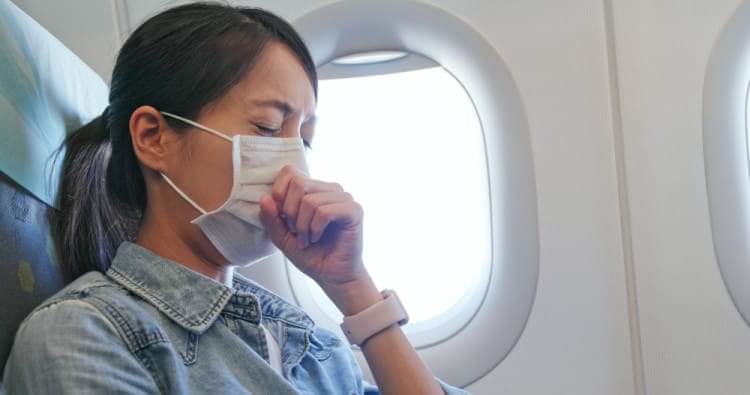
Although there are some rare horror stories of someone contracting an airborne virus, it is safe to say that you can breathe in the plane air without any worry. It is because you are breathing through the engine's compressors. It is known as the "bleed air" system which combines fresh breathable and re-circulated air. In other words, it is similar to an average office air.
20. Flying with Pets
There has been a never-ending debate over the most effective way to travel on planes with pets. When it comes to traveling with pets, it is undoubtedly stressful for those poor souls and their owners as
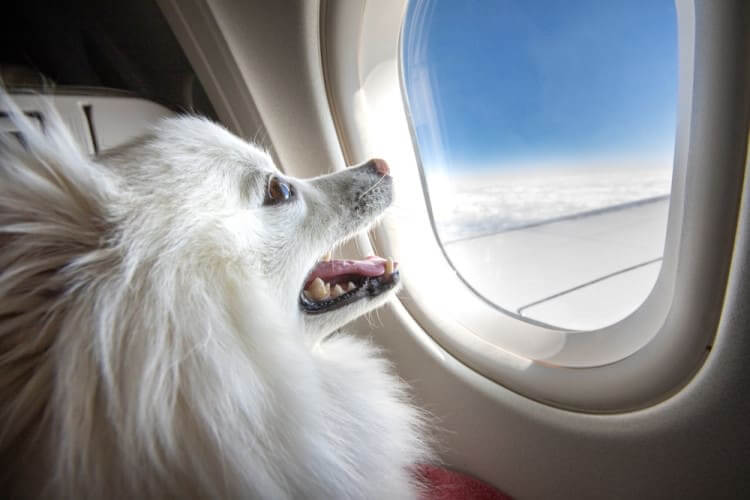
So, when you are preparing to travel with your beloved pup, you need to know about factors such as noise caused by pets can't be avoided. However, you can find some relief knowing that airlines attempt their best to handle pet travel without any incident.
21. Does Less Price Mean Less Safety?
If you have ever traveled on a budget airline, you may have wondered whether purchasing a ticket on a discount means you are gambling on safety. Relax because there is no need to worry. Understand that airlines never compromise on safety while determining ticket pricing.
For cheap prices, airlines usually customize certain aspects such as seat selection, baggage fees, and legroom amenities. So, go with a budget airline without concerning about your safety.
22. Oxygen Masks Are Only Good For A Short Time
Frequent travelers may have even remembered the entire speech about oxygen masks. It is quite rare for you to find yourself using a drop-down mask in flight, so you may have wondered how they actually work. The drop-down oxygen mask works for about 15 minutes.
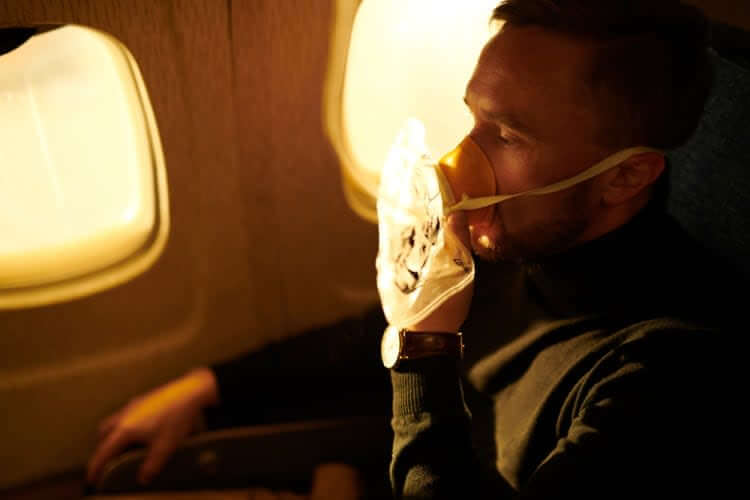
This 15 minutes worth of oxygen may not seem like a lot, but it is enough if you take deep breaths. During the time you are inhaling the oxygen from the mask, the pilot is able to descend to an altitude where he is able to equalize the cabin pressure.
23. Are Planes Really Clean?
This is one answer you better not find. Most airplanes are not that clean. There are turnover crews that vacuum and empty trash from the cabin, but what about the windows, armrests, and tray tables?
Ignorance is bliss. The best you can do is to bring your disinfectant wipes. Moreover, the FAA isn't in charge of how often planes are cleaned, so the airlines often make their own decisions regarding cleaning.
24. What If The Engine Fails in Flight?
In case the engine fails in flight, you probably won't even notice it. Although it is quite rare to experience an engine failure in flight, there are cases in which it has happened. Thankfully, present-day passenger jets are equipped enough to safely fly even if one of the engines fails.
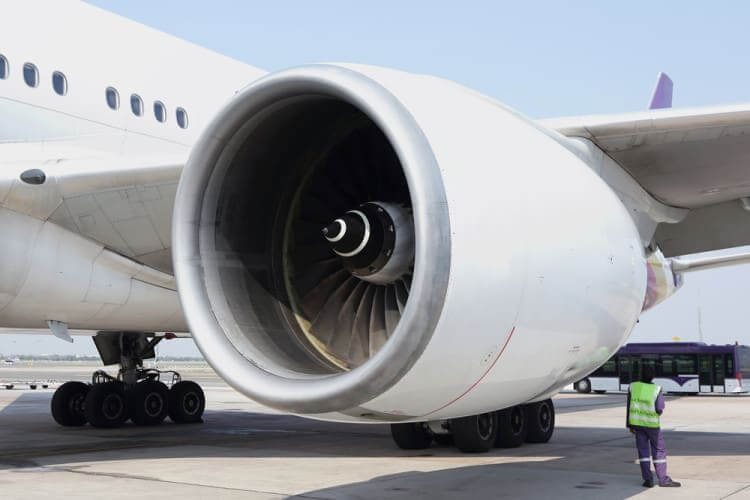
In a case both engines fail, the plane can glide at approx. 1.5 nautical miles for every 1,000 feet of altitude. So, there is no need to worry because pilots are specifically trained to handle this kind of situation as well.
25. The Best Time to Travel By Plane
As flight crews travel the most, they are the ones who know about the best time to fly (of course). They have a few helpful tips for you when choosing the best time and day to fly. But first, the bad news for you is that you'll have to wake up early. The good news for you is that waking up early and taking a flight will help avoid inclement weather.
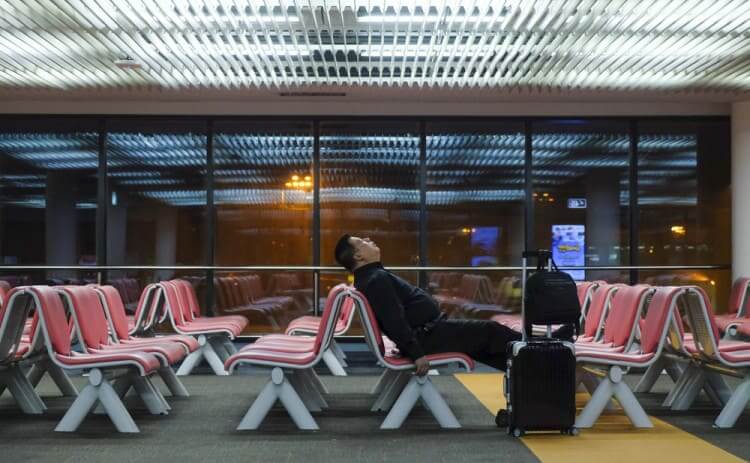
Although there is no guarantee, it is said that morning flights have less turbulence as compared to flights earlier in the day. So, we would recommend you to take early morning flights as there will be less hassle at the airport and also your plane is less likely to run into thunderstorms.
26. Using Autopilot
If you've had ever wondered how often the autopilot feature is used during fights, you'd be surprised to know that pilots activate autopilots for almost 90% of commercial flights. But there is no need to freak out. The human touch is important for the critical moments of the flight: the takeoff, landing, and taxing to the gate.
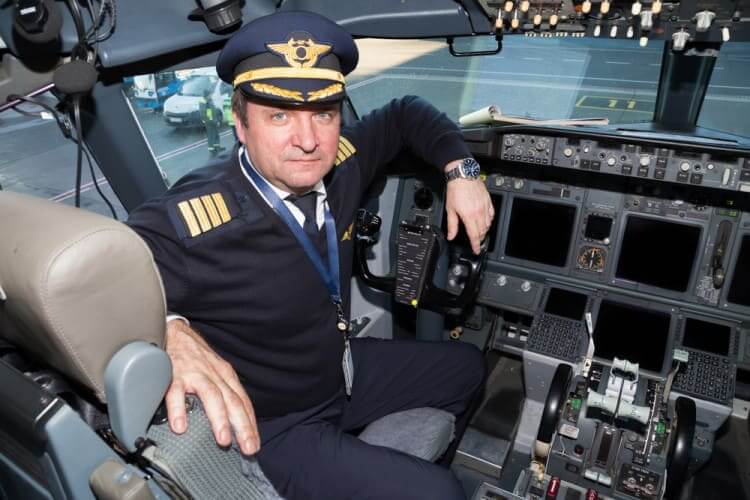
The autopilot is only used for the cruising period. But it doesn't mean that the pilot sits and watches a movie as the autopilot does everything. Autopilot allows the pilot to focus on other tasks such as communication operation and navigation.

